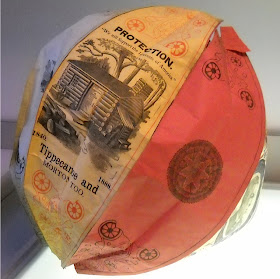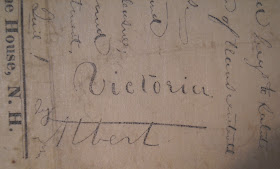 This paper lantern balloon from the 1888 Presidential campaign of Benjamin Harrison and his running mate Levi Morton was a common form of campaign advertising ephemera in the 1870s and 80s. Used in evening torchlight parades, the balloon was formed over a wire frame on the end of a long stick with an oil lantern inside. Needless to say, this combination of paper and flame (and their close proximity to one another) virtually ensured the future rarity of these lanterns, if not the short lived terror of the bearer of the stick should a breeze blow unfavorably.
This paper lantern balloon from the 1888 Presidential campaign of Benjamin Harrison and his running mate Levi Morton was a common form of campaign advertising ephemera in the 1870s and 80s. Used in evening torchlight parades, the balloon was formed over a wire frame on the end of a long stick with an oil lantern inside. Needless to say, this combination of paper and flame (and their close proximity to one another) virtually ensured the future rarity of these lanterns, if not the short lived terror of the bearer of the stick should a breeze blow unfavorably.One segment of the balloon has the bastardized slogan "Tippecanoe and Morton too," a play on Benjamin Harrison's father's successful 1840 campaign for the Presidency in which "Tippecanoe and Tyler too" became a famous slogan and song. Benjamin Harrison, who lost the popular vote, but won the electoral college, would have considerably more luck than his father in carrying out the duties of the highest office of the land. William Henry Harrison died a mere 30 days after his famously long inauguration speech in inclement weather. The log cabin motif was also meant to harken back to William Henry Harrison's portrayal of himself as a rugged and frugal frontier everyman despite his genteel southern upbringing and wealth.
With both the Republican and Democratic conventions upon us it bears remembering, while we watch two wealthy urban candidates attempt to manufacture a common man appeal, that there is nothing new under the sun where politics are concerned.
This lantern, as well as a number of other pieces spanning the years 1841 to 1973, is currently on display in the Class of 1965 Galleries in Rauner Library as part of an exhibit on political campaigns and political action.
You can find the lantern and other interesting campaign materials in the the Ralph E. and William W. Becker Collection of American Political Campaign Materials.


